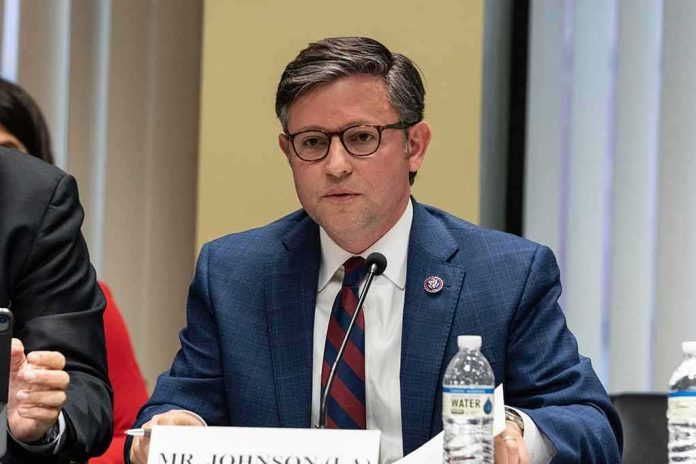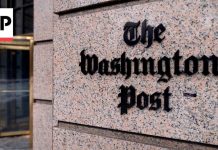
In a political landscape rife with power plays, President Donald Trump’s private remarks about House Speaker Mike Johnson reveal a dynamic that could redefine the perception of political influence in Washington.
Story Snapshot
- Trump claims to control Speaker Mike Johnson, saying “I’m the speaker and the president.”
- Johnson’s actions during a government shutdown highlight his alignment with Trump’s agenda.
- The relationship raises concerns about the erosion of legislative independence.
- Johnson faces public criticism from Trump despite his loyalty.
Trump’s Perceived Control Over Johnson
President Donald Trump reportedly boasted in private conversations that he holds significant sway over House Speaker Mike Johnson, claiming, “I’m the speaker and the president.” This declaration underscores Trump’s belief in his influence over legislative actions, with Johnson’s conduct amplifying the perception of subservience. The context of these remarks becomes critical during the ongoing government shutdown, initiated by Johnson’s indefinite suspension of Congress on October 1, 2025, while aligning closely with Trump’s political demands.
Johnson’s role as Speaker since October 2023, following Kevin McCarthy’s ousting, places him in a unique position. His early alignment with Trump’s legislative priorities, including support for controversial policies and defense of Trump’s legal battles, highlights his loyalty. This history of allegiance creates a backdrop for the current power dynamics, where Trump’s private comments illuminate a perceived erosion of legislative autonomy in favor of executive influence.
Johnson’s Challenges Amidst Trump’s Criticism
Despite his unwavering support, Johnson faces public criticism from Trump. The president’s recent disapproval of Johnson’s funding plans as “reckless” reveals tensions in their relationship. Trump’s insistence that any legislative action not meeting his standards constitutes betrayal further complicates Johnson’s political calculations. These developments raise questions about the stability of Johnson’s speakership, drawing parallels to the precedent set by McCarthy’s removal, and highlighting the precarious nature of governing under Trump’s shadow.
Johnson’s refusal to swear in Democratic Congresswoman-elect Adelita Grijalva, citing a lack of authority, exemplifies the challenges he faces in balancing constitutional duties with political loyalty. Critics argue this decision reflects Johnson’s prioritization of partisan alignment over legislative responsibility, reinforcing concerns about the integrity of congressional independence. These actions contribute to a broader narrative of legislative subservience in the face of executive power.
Impact on Republican Party Dynamics
The power dynamics between Trump and Johnson underscore a fundamental shift within the Republican Party, where leaders navigate the complexities of serving both Trump’s interests and their constitutional roles. Johnson’s predicament illustrates the challenges Republican leaders encounter in reconciling Trump’s demands for absolute loyalty with the practicalities of governance. This tension fosters an environment where effective leadership becomes increasingly elusive, as any deviation from Trump’s agenda risks political jeopardy.
LOYALTY MEANS NOTHING TO TRAITOR TRUMP!
Trump Humiliates Mike Johnson Behind Closed Doors https://t.co/Sn2vU0cBI4 via @thedailybeast
— lou's rant (@lousrant) October 27, 2025
Analysts describe Johnson’s situation as an “impossible position,” where the demands of governance clash with the expectations of unwavering allegiance to Trump. This dynamic not only affects individual leaders but also has broader implications for the party’s capacity to engage in constructive policymaking. The ongoing government shutdown serves as a stark reminder of the consequences of prioritizing partisan loyalty over pragmatic governance.
Long-Term Implications for American Governance
The relationship between Trump and Johnson highlights a concerning trend in American governance, where traditional notions of congressional independence are increasingly challenged. The concept of the legislative branch as a co-equal check on executive power appears diminished when leaders prioritize loyalty to the president over their constitutional responsibilities. This shift raises fundamental questions about the separation of powers and the future of democratic accountability.
The implications extend beyond individual political figures, affecting public trust in governmental institutions. When leaders defend controversial actions, such as Trump’s AI-generated video mocking protesters, it signals a disconnect between government actions and democratic norms. This erosion of public respect for institutions underscores the need for a reevaluation of political priorities and the restoration of legislative integrity.












